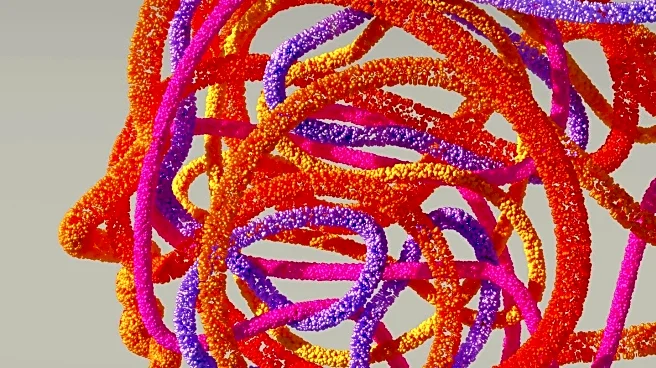What's Happening?
Drug Farm, a biopharmaceutical company, has announced the publication of a study in Nature Communications detailing the discovery and preclinical characterization of DF-003, a first-in-class ALPK1 inhibitor. DF-003 is designed to treat ROSAH syndrome, a rare genetic disease characterized by symptoms such as retinal dystrophy and optic nerve edema. The study highlights DF-003's ability to cross the blood-retina and brain barriers, reducing inflammatory cytokines and disease phenotypes in a mouse model. The drug has completed a Phase 1 clinical trial and is currently in a Phase 1b trial for patients with ROSAH syndrome.
Why It's Important?
The development of DF-003 is significant as it addresses the genetic root cause of ROSAH syndrome, a disease with no approved treatments. By inhibiting ALPK1, DF-003 has the potential to mitigate NF-κB-mediated inflammatory responses, which are implicated in various diseases, including cardiovascular conditions. This advancement could lead to new therapeutic options for patients suffering from ROSAH syndrome and possibly other diseases driven by excessive ALPK1 activity. The ongoing clinical trials will further assess the drug's efficacy and safety, potentially paving the way for its approval and use in clinical settings.
What's Next?
DF-003 is currently undergoing a Phase 1b clinical trial involving patients with ROSAH syndrome. The results of this trial will be crucial in determining the drug's effectiveness and safety profile. If successful, Drug Farm may proceed to later-stage trials, which could eventually lead to regulatory approval. The company is also exploring the drug's applicability to other conditions associated with ALPK1 activity, which could expand its therapeutic use beyond ROSAH syndrome.
Beyond the Headlines
The discovery of DF-003 not only represents a potential breakthrough for ROSAH syndrome but also highlights the innovative approaches in drug development using genetic and AI technologies. Drug Farm's IDInVivo platform, which combines these technologies, has been instrumental in identifying novel drug targets and pathways. This approach could revolutionize the way rare genetic diseases are treated, offering hope for conditions that currently lack effective therapies.








